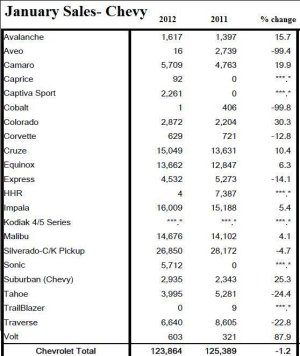...But, the volt and it's recall because of actual documented battery fires (Yes, that's right: proven battery fires) doesn't merit a mention in James' world.
Spin in how you want. You're going to any way. And we bailed out this company for what? jobs in other countries?
Volt battery fires?
Here is a fact for you. There wasn't a SINGLE battery fire of a Volt in the hands of a purchaser. None. Not one.
And there was no recall for Volt battery fires. None. Not a single recall. Not a single one.
Let's get that straight. Your obession with non-existent battery fires is worse than my obesssion with wanting to ensure AMERICAN MADE CARS succeed.
The battery fire you refer to...was a battery fire that took place THREE WEEKS after a CRASH TEST, in which a car was intentionally damaged in a crash test. That's a fact.
And yes, a short circuit cause a fire three weeks after the crash test.
There were probably 100 times the number of car fires in the same time period, caused by battery cables short circuiting, after a crash test, in conventional gasoline powered cars. When cars smash up, sometimes there are fires later. That's true in electric cars as well as gasoline powered cars. I'm sure more gasoline powered cars caught fire from battery cables shorting after a smash up over that same time period. But nobody really cared about them.
Yet those who are so right-wing hard over on destroying American manufacturing call up fictional problems that don't exist for Congressional hearings.
http://thehill.com/blogs/transporta...-lawmakers-question-development-of-chevy-volt
What a friggin waste of Congressional time and effort. While the Country seriously needs Congress to focus on helping American workers succeed- the House is wasting time on that.
Ok- you want to talk about where cars are made? The Chevy Equinox is NOT final assembled in the USA. You are correct. But the biggest single component of the Equinox, the 2.4 liter engine, IS made in the USA. Tonawanda, NY, to be exact. Where thousands of American citizens are employed. So are the tires, made in Indiana. So are various components- the seats, the struts, the wiring harnesses, the sheet metal. All components that come from USA facilties, to meet up with other parts made around the world, and crafted into fine automobiles in the USA, in Canada, in Mexico, and elsewhere.
But, had GM gone bankrupt, all those workers in Tonawanda, in Indianapolis, in Monroe, Michigan, etc. would have been without jobs. Period.
Yes, I believe it was correct and valuable to save the U.S. automakers from destruction.
Your mileage can vary. have fun.
Attack the American worker all you want. As for me, I'll always continue to defend the American worker, and buy American made cars. Period.


